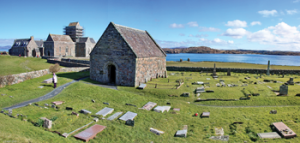What the sources say
Published in Issue 2 (March/April 2014), Volume 22
Above: Iona—it was burned in 802 and 68 members of its community were killed in 806. The destruction of Iona caused a profound shock.
The contemporary Annals of Ulster, recording the Battle of Tara in 980, state that ‘The battle of Temair was won by Máel Sechnaill son of Domnall against the foreigners of Áth Cliath and the Isles, and very great slaughter was inflicted on the foreigners therein, and foreign power ejected from Ireland as a result’, implying that this was the end of an era. Cogadh Gáedhel re Gallaibh (‘The war of the Irish against the Foreigners’) is very clever propaganda (written on behalf of Brian Boru’s great-grandson, Muirchertach, who died in 1119) extolling the virtues of the O’Briens, whose rise to power was only a few generations old. The Book of Leinster version opens with the statement that ‘There was a great and widespread oppression upon the men of Ireland from Norwegians and hard-hearted, hard to endure, Danes during an extended period and for a long time that is, for 170 years (or 200 according to some) from Artrí [mac Cathail, king of Cashel, 793–821] to Brian son of Cennétig …’. The culmination of this period was the Battle of Clontarf, at the end of which, although victorious, Brian was killed. The Cogadh relates that the Viking leader, Tuirgéis, seized the abbacy of Armagh and gave Clonmacnoise to his wife, Otta. From the altar in the great church she answered questions put to her (acting as an oracle). This is a wonderful drama, of course, highlighting the paganism of the Vikings. The sober entry in the Annals of Ulster under the year 845 confirms that the Vikings rampaged throughout the central midlands and plundered and burned Clonmacnoise with its churches (a gloss claims that they were led by Tuirgéis). Tuirgéis was subsequently taken prisoner in the same year by Máel Sechnaill, the high-king, and drowned in Lough Owel (a method of execution that showed disdain for him).
















